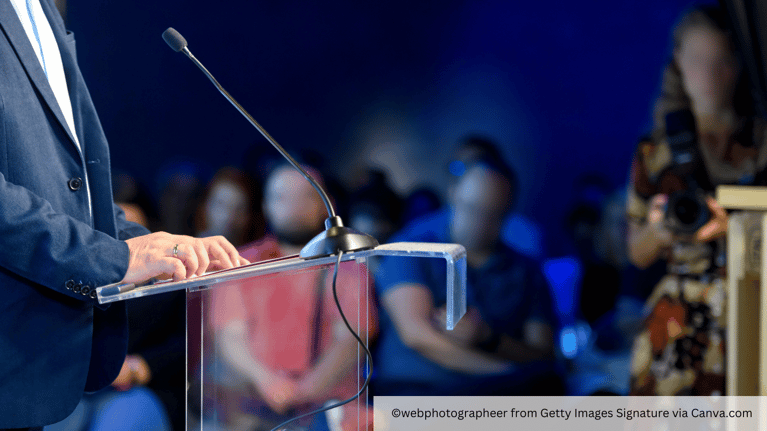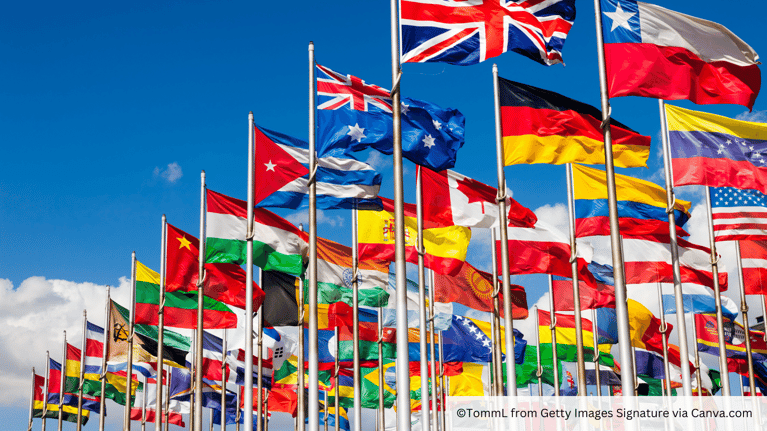
Why Does Your Business School Need Competitor Analysis?
As the digital world keeps evolving, business schools need smart social media strategies that go beyond basic marketing. Our guide breaks down how to gather and use digital insights effectively, giving your institution a clear framework to stay ahead. In this article: Why Competitive Intelligence Matters Key Components of Effective Social Media Competitive Intelligence Content Strategy Analysis Platform-Specific Insights Technological Tools for Competitive Intelligence Why You Should Watch Platforms You're Not Actively Using Strategic Priorities for 2025 Transforming Insights into Strategy Key Takeaways

What applicants really want to read about your institution
Post pandemic, amidst widespread cuts across the university sector - especially in the UK, finding a stable and consistent identity from which to market one’s institution from, can create challenge and uncertainty for universities and schools, in a forever changing industry.

Sport, Spectacle and Strategy: How UK Universities Could Rethink Recruitment
It's 6pm on a Saturday night in Birmingham, firework smoke rolls across the Bournbrook playing field as cheerleaders perform a routine to a hillside with several thousand onlooking spectators.

5 Ways PR Can Boost Student Applications
Across the globe, business schools and universities are locked in fierce competition for the best and brightest students. From MBA programmes to executive education courses, institutions are not only tasked with delivering world-class education - they also need to consistently attract new waves of applicants who are informed, selective, and often overwhelmed by choice.

When NOT to pitch a story
One of the hardest parts of PR is knowing when to say no. Google ‘How to say no’ and you’re met with countless think pieces, links to therapists, podcast episodes, Reddit threads, and YouTube videos.

What PR Services Suit Business Schools Best
The world’s best and brightest business schools all accept one core truth: institutions need PR.

How to select success stories that will boost applications
As a business school or university, students are integral to the existence of your institution. After all, what is a school without the individuals who want to learn?

PR versus conspiracy theorists (how PR can pioneer the truth)
In a world awash with misinformation, where viral falsehoods can spread faster than the truth, public relations professionals find themselves in a curious position. They are, at their core, the stewards of reputation, tasked with crafting narratives that shape public perception. But in an era when conspiracies proliferate and trust in institutions must be protected, PR must navigate a precarious line between promotion and authenticity. The challenge is not merely to counter misinformation but to pioneer the truth. This is an effort that requires vigilance, transparency, and an unflinching commitment to credibility.

How to Communicate Diversity and Inclusion Initiatives in Today’s World
In today’s evolving corporate landscape, diversity and inclusion (D&I) are not just checkboxes, but fundamental elements of an organisation's success.

Three tips for academics to build presence online
As an academic, cultivating an online presence offers essential opportunities for networking, career advancement, and boosting the visibility of your research. For women and members of more marginal groups in academia, developing an online presence can also empower people by enabling community-building.

Is Creative AI Becoming A Problem?
“You know what the biggest problem with pushing all-things-AI is? Wrong direction.

Why employers should invest in employee training
Looking to unlock people's full potential? Here’s why investing in employee training is certainly something to consider from my perspective, having just completed my apprenticeship with a Distinction.

What is Business School PR really about?
If you were to ask a group of people, “What does business school PR involve?” you’d probably get one of these three answers:

Looking to Expand Your Communications Team? Here’s How to Ensure ROI from Day One
When considering the best way to scale your communications efforts, a common question arises: Should start-ups hire in-house PR experts, or outsource to specialised PR agencies? Unfortunately, there is no simple yes-or-no answer.

Shift in Social Media Trends: How Hashtags Fell Out of Favour
Hashtags have long been a tool to group content and conversations around specific topics, allowing users to easily discover content that aligns with their interests.

Why PR Will Keep Student Applications Rolling in Over the Holidays
As the holiday season approaches, professors, students, and staff are looking forward to a much-needed break after what has likely been a busy and challenging year. While the festive period is a time for relaxation and celebration, it is also an excellent opportunity for business schools to make a lasting impression on prospective students.

Harsh - but sometimes fair - opinions about press releases
Press releases can be one of the most effective communication tools. They’re a quick way to disseminate information widely to a targeted audience, and a well-written press release can demonstrate professionalism and credibility for your business school.

Do business schools need content gurus?
Quality content has never been a more valuable currency for business schools.

How a PhD can lead to a PR career
A PhD in Classics and English Literature might not look like the most natural point from which to jump into PR, but many of the skills you learn doing a humanities PhD are highly relevant for PR work and train you in effective communication. With all that time in dusty libraries, it is also a pleasure and a privilege to get to take those skills and put them in a team setting.

Where now for international higher education?
The higher education sector exists in a permanent state of flux. Things are constantly changing. Priorities. Curriculums. Offerings.

The power of newsjacking for universities and business schools
One thing you can find in most news pieces, whether that is live TV, radio, podcasts or written news, is an expert opinion to add variety and back up the statements in the article. Has this person – or their PR support – jumped on the news agenda to get there?

Is it ever good PR to bad-mouth a competitor?
When forming a PR strategy, there can be a real temptation to bad-mouth your competitors. It stems from the mentality that there are a finite number of customers and resources, and that success is, therefore, a zero-sum game. Big corporations are often prime examples. Think of the public rivalries between brands like Coca-Cola and Pepsi, or Apple and Microsoft.

Measuring PR success
Public relations is often all about improving and increasing the image of a brand or institution. It makes sense that a key part of the process is therefore measuring its success. Just like anything else you invest in, you want to make sure the service you get is worth it but, in the PR industry, is that easier said than done?

3 tips to communicate dry & dreary topics
We’ve all been there: an exciting piece of research lands on our desk, having sparked a buzz in the academic world. The problem? It’s written in such dense, technical wording that its relevance flies right over the heads of anyone outside the expert bubble.

Why it’s easier to succeed with press coverage than you might think
Do you find yourself apprehensive about engaging with the media to secure press coverage?

What should business schools discontinue on social media this academic year, and what should they prioritise instead?
As the academic year unfolds, business schools must navigate the constantly changing social media landscape. It’s essential for these institutions to update their strategies to maximise impact and avoid outdated or ineffective methods. Here’s a look at what business schools should leave behind on social media this year and where they should focus their efforts instead…

A lesson in dealing with poor performance
Do we all know what it’s like to, on occasion, perform to a level that is less than our best?

This is how to do scholarly publication PR
Once academic research has been done, it is important for that research to be exposed to people, to the general public, and for the important messages of the research to be broadcast widely, for its findings to be disseminated and thereby being able to effect society at large. This is as important for researchers as it is for research itself; professors are assessed more and more on the academic and wider “impact” of their research.

Convincing sceptics that a strong PR strategy is key to admissions success
For business schools and universities, PR plays a critical role in shaping perceptions, enhancing visibility, and engaging prospective students. An interview may be brief, but the article that comes from it can have long-lasting effects.

Five reasons why academic journal promotion can be great PR
Writing an academic research paper can take a few months to several years. But the work doesn’t stop once the paper is published. Now it’s time to think about promoting your findings in the media and on social media.

How can student-led start-ups boost your business school PR?
From new products and services to fresh approaches to old problems, entrepreneurs are often the force behind innovation and cultural change. Whether for good or bad, entrepreneurs like Mark Zuckerberg, Billy Ingram & Walter Anderson, Henry Ford, and Steve Jobs have had global cultural impacts.

How you can make the most of rankings using PR?
It’s often the same story every year. Business school rankings are released by notable, influential media platforms and organisations all around the world.

What education PRs can learn from Taylor Swift
The pop girlies are having a moment this year. Sabrina Carpenter, Chappell Roan and Charli XCX can all teach us a thing or two about effective PR campaigns.

How to win over more journalists
Building good relationships with journalists is a key part of working in public relations. It can help you to really build your earned media coverage, and can even make your day-to-day working life all the more pleasant. It doesn’t have to be hard or scary, but how do you do it?

Why you need a LinkedIn newsletter: a strategic advantage for business schools
As the ‘professional’ social media platform, with around a billion members, LinkedIn has solidified its position as the place for networking and thought leadership content distribution. Which is one of the reasons why adding LinkedIn newsletters into your marketing and communications mix can significantly elevate your outreach strategy. Let's explore why LinkedIn newsletters deserve your attention and how to harness their full potential…

6 reasons you should consider podcast opportunities for your faculty
Business schools face the ongoing challenge of staying relevant and engaging to both current and prospective students as well as other key stakeholders. One innovative strategy that can significantly enhance a business school’s visibility and influence is by leveraging faculty members in podcast opportunities. By putting faculty forward for podcasts, business schools can amplify their thought leadership, connect with wider audiences, and enrich their educational offerings.

Journalists need you – here's what you must do more of
Imagine you’re a journalist on a tight deadline. You might be working on a trend piece for a globally-read magazine, planning an upcoming podcast recording, or perhaps reporting on a news story for a national daily newspaper. Your draft is due tomorrow, but you urgently need an expert comment to include. Where do you go?

Why show off the strengths and advantages of an MBA programme?
Showcasing the strengths and advantages of an MBA programme is crucial for institutions to present their best aspects to the world and potential students. Many stakeholders have an interest in the MBA being shined and shown off, such as current students, other institutions offering MBAs, board members, faculty, and alumni.

30% of marketers who don’t use short-form video will start to this year - are you utilising video content?
Video content has boomed more than ever before, and it’s no surprise! It is an easy-to-digest format that often gives our eyes a break from the overwhelming amount of text we look at all day long.

Should academic experts combat online misinformation?
Rewind to 2017, in the aftermath of the Brexit vote, prominent Brexiteer Michael Gove famously said “people in this country have had enough of experts”. Though to many this seemed like a stupid statement – surely you can trust the experts the most?

How business schools can attract international students
Regardless of ranking, prestige or the specialisms a business school might offer, there is little doubt that part of what makes a programme uniquely valuable is the cohort.

How to use PR to attract new faculty
The role of PR in supporting student recruitment efforts is well-documented. Few successful institutions overlook the importance of impactful content, expertly crafted for – and strategically placed within – go-to sources for prospective applicants. Far from it. The time, effort and resources that schools dedicate to creating content is staggering.

Why alumni are essential to your PR strategy
McKinsey’s ‘war for talent’ isn’t restricted to businesses anymore; it rages throughout the business education sector too. Business schools compete to attract the most talented students into their flagship programmes.

Unlocking effective media relations for professors
Academia and the media go hand in hand, and today business schools and universities are becoming increasingly aware of why engaging with the media is valuable for not only their professors, but also their institutions as a whole.

5 lessons on why digital PR matters
Today, the world is always online. Increasingly, what matters is what happens online. When an event of any notes happens, its ramifications are debated online. Now, public and personal opinion is decided on the internet. Brands and companies have never been more concerned about what happens online. Reputations are bought, busted, and buoyed on the internet. Although the feelings people have toward brands and companies still happen in people’s minds (for now), the content each person works with to form opinion is primarily found on the internet. For these reasons and more, digital PR has never been more important.

How PR boosts university events
So, you’re hosting a webinar, summit or debate at your institution. And you want to make it a success, instead of it becoming… forgotten about. The tools in your arsenal? Maybe some impressive stage lights…some fancy dinners… a celebrity guest?

What’s top of the FT Ranking Editor’s agenda? Q&A with Leo Cremonezi
There are so many reasons why business school rankings continue to be important.

Enhance your business school's reputation with one powerful tactic: Media visibility
From multinational corporations to pop singers to business schools, no reputation is ever static. A brand’s reputation is fluid and ever-changing – just look at Taylor Swift.

Why connection on social with your students matters
Social media is central to the way in which young people engage with the world around us. It is essential for your institution to establish, of course, brand awareness and brand loyalty, but one that is of significant importance, is the connection with students. With so many people already active on social media platforms, you need to meet your prospective students, current students, and alumni where they are. An effective social media marketing strategy can be a great recruitment tool, a convenient way to quickly share announcements, an effective way to build a community, and so much more. The possibilities are endless!

Mastering the pitch: Tried and tested strategies for smarter PR
Journalists are flooded with emails and pitches. With there being around six PRs to every journalist nowadays, their inboxes are waterlogged. They exist in a bog of emails and pitches. But how can you get them to open your email, how do you hook them with your pitch?
